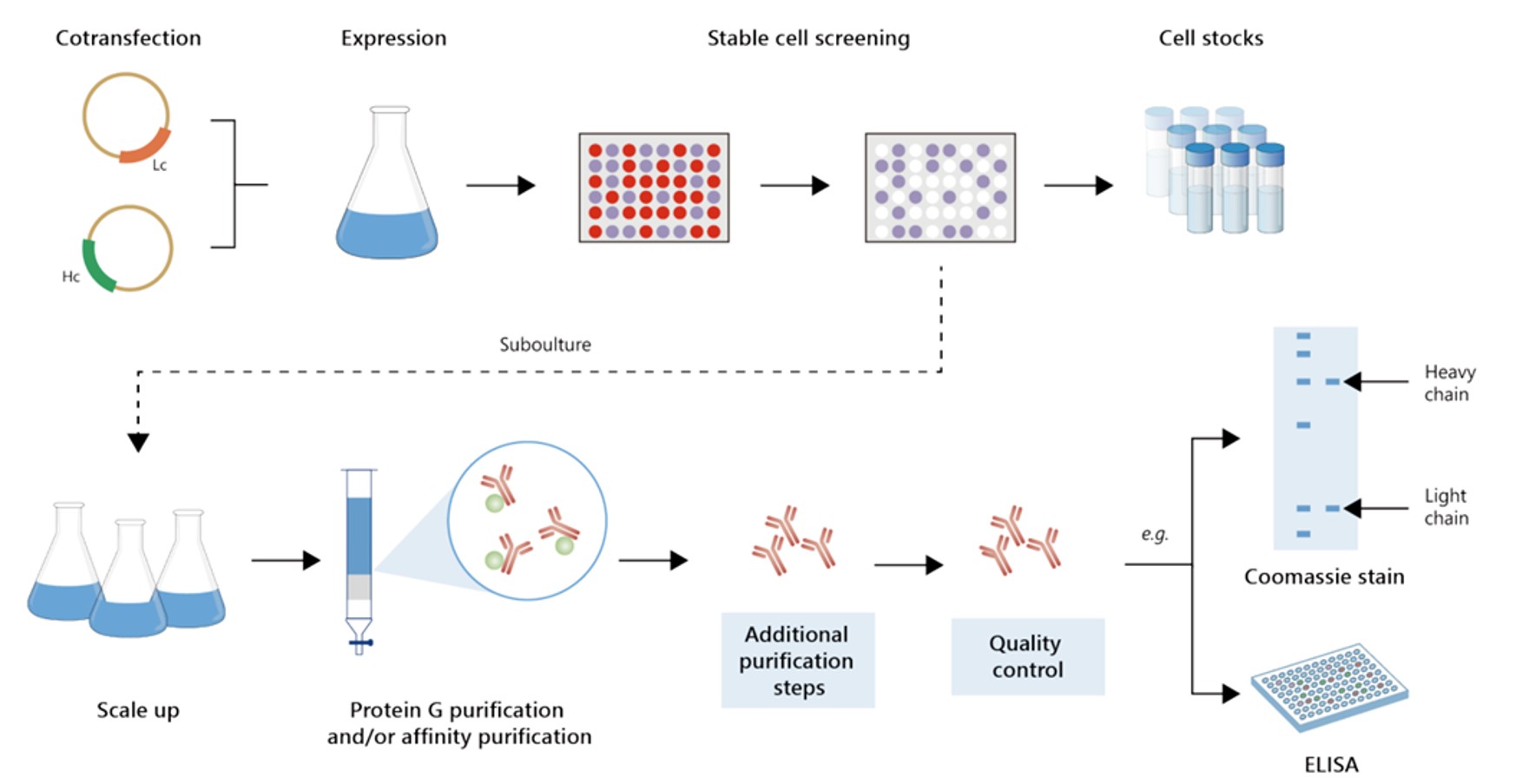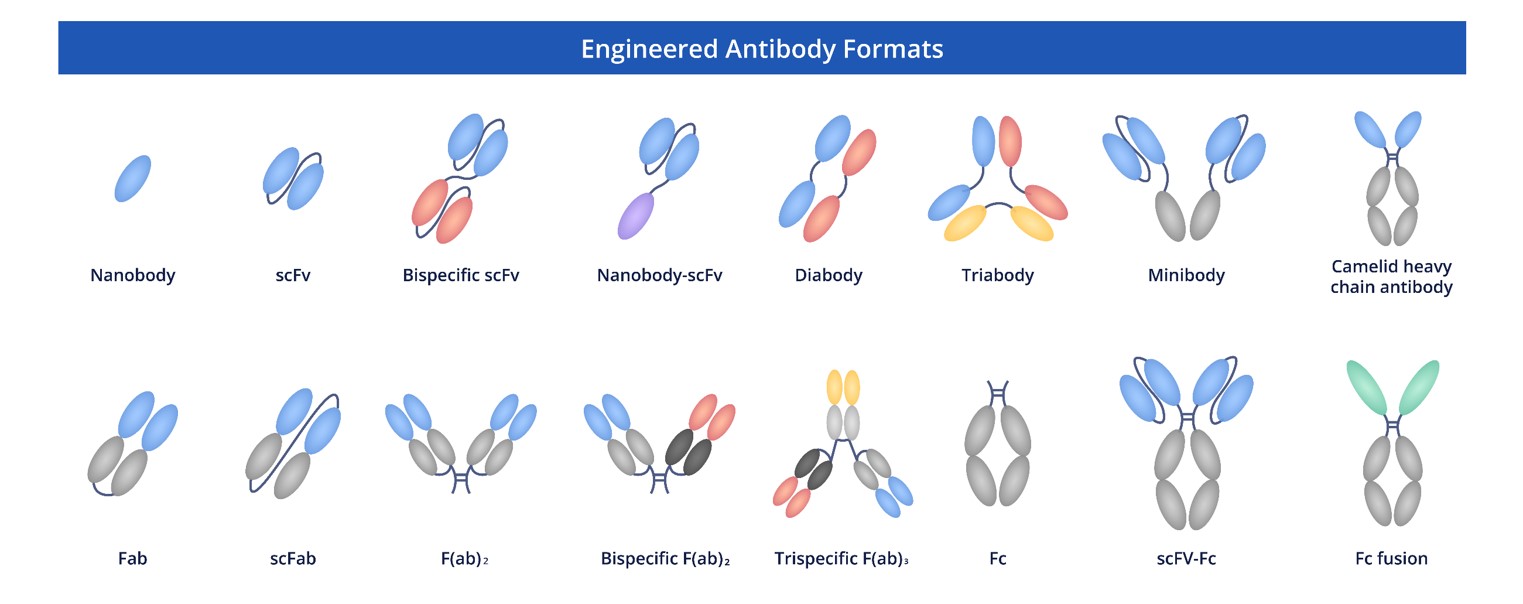 Loading...
Loading...

Anti-HTR7 Recombinant Antibody Products
 Loading...
Loading...Anti-HTR7 Products
- Mouse Anti-HTR7 Recombinant Antibody (MOB-2993z) (MOB-2993z)
-
- Species Reactivity: Human
- Type: Mouse IgG2b
- Application: FC, IHC, CyTOF
- Recombinant Anti-Human HTR7 Antibody Fab Fragment (MOB-2993z-F(E))
-
- Derivation: Mouse
- Species Reactivity: Human
- Type: Fab
- Application: WB, Neut, FuncS
- Recombinant Anti-Human HTR7 Antibody scFv Fragment (MOB-2993z-S(P))
-
- Derivation: Mouse
- Species Reactivity: Human
- Type: scFv
- Application: ELISA, WB, FuncS
-
- Derivation: Phage display library
- Species Reactivity: Human
- Type: Rabbit IgG
- Application: WB
- Rabbit Anti-HTR7 Recombinant Antibody (VS13-YC561) (VS13-YC561)
-
- Species Reactivity: Human, Mouse, Rat
- Type: Rabbit IgG
- Application: WB
- Anti-HTR7 Immunohistochemistry Kit (VS-0525-XY3356)
-
- Species Reactivity: Human
- Target: HTR7
- Application: IHC
Can't find the products you're looking for? Try to filter in the left sidebar.Filter By Tag
Our customer service representatives are available 24 hours a day, from Monday to Sunday. Contact Us
For Research Use Only. Not For Clinical Use.
Creative Biolabs delivers cutting-edge recombinant antibody solutions targeting HTR7, designed to meet the evolving challenges of biomedical research. Utilizing next-generation production platforms and refined development protocols, we ensure that every product maintains exceptional consistency, specificity, and reliability across experimental settings. Our extensive collection of antibodies is crafted to support accurate results and streamline laboratory workflows across a broad range of applications. Alongside our dependable reagents, we provide dedicated technical expertise to assist scientists throughout their projects. By partnering with Creative Biolabs, researchers benefit from advanced molecular tools and a knowledgeable team committed to accelerating discovery and scientific impact.
HTR7: A Multifunctional Regulator in Neurological and Immune Related Disorders
The serotonin receptor known as HTR7 has garnered significant interest for its diverse physiological and pathological roles, particularly within the central nervous and immune systems. Abnormalities in its signaling pathway have been associated with various psychiatric disorders such as anxiety, schizophrenia, and major depressive disorder, often through disruptions in serotonin-related neurotransmission. Its involvement in regulating circadian rhythms and the sleep-wake cycle also highlights potential relevance to mood regulation and chronobiological imbalances. In depressive models, deviations in receptor function appear to influence emotional processing and stress adaptation by altering serotonergic tone. Outside the brain, it has been implicated in the regulation of immune-inflammatory responses, with studies linking it to disorders like asthma and irritable bowel syndrome—conditions where neural and immune systems closely interact. Its distribution in blood vessels indicates a role in vasodilatory function and migraine mechanisms. These overlapping activities make it a compelling target for drug discovery, particularly for patients who show limited response to conventional pharmacological therapies. As investigations advance, its broader influence on physiological homeostasis continues to position it as a promising candidate in both neurological and multisystemic therapeutic strategies.
Alternative Names
Complement HTR7; 5-Hydroxytryptamine (Serotonin) Receptor 7, Adenylate Cyclase-Coupled; 5-HT-X; Serotonin Receptor 7; 5-Hydroxytryptamine Receptor 7; 5-Hydroxytryptamine (Serotonin) Receptor 7 (Adenylate Cyclase-Coupled)
Background
The neurotransmitter, serotonin, is thought to play a role in various cognitive and behavioral functions. The serotonin receptor encoded by this gene belongs to the superfamily of G protein-coupled receptors and the gene is a candidate locus for involvement in autistic disorder and other neuropsychiatric disorders. Three splice variants have been identified which encode proteins that differ in the length of their carboxy terminal ends.
FDA approved drug targets, G-protein coupled receptors, RAS pathway related proteins
Membrane
Cell type enhanced (Inhibitory neurons, Spermatocytes, Early spermatids, Excitatory neurons)
Immune cell enriched (myeloid DC)
Cell line enhanced (HBEC3-KT, hTCEpi, hTERT-HME1, LHCN-M2, U-251 MG, U-87 MG, WM-115)
G-protein coupled receptor, Receptor, Transducer
Anti-HTR7 rAb Products
Our anti-HTR7 recombinant antibodies are designed to enhance your research through rigorously validated performance and batch-to-batch consistency. We provide these reliable tools alongside responsive technical support for troubleshooting and protocol optimization, helping you achieve reproducible results across applications like WB, IHC, or flow cytometry.
| Cat. No. | Product Name | Target Species | Host Species | Applications |
| MOB-2993z | Mouse Anti-HTR7 Recombinant Antibody (MOB-2993z) | Human | Mouse | FC; IHC; CyTOF |
| MOR-1711 | Rabbit Anti-HTR7 Recombinant Antibody (clone DS1711AB) | Human | Rabbit | WB |
| VS13-YC561 | Rabbit Anti-HTR7 Recombinant Antibody (VS13-YC561) | Human; Mouse; Rat | Rabbit | WB |
| MOB-2993z-F(E) | Recombinant Anti-Human HTR7 Antibody Fab Fragment | Human | Mouse | WB; Neut; Funcs |
Customer Reviews

Mouse Anti-HTR7 Recombinant Antibody (MOB-2993z) (CAT#: MOB-2993z)

Rabbit Anti-HTR7 Recombinant Antibody (VS13-YC561) (CAT#: VS13-YC561)
rAb Production
Our team leverages extensive experience in recombinant antibody engineering to produce rigorously validated research tools. We prioritize both quality and efficiency, offering reliable antibodies with comprehensive characterization data to support various applications. This approach helps researchers obtain consistent results while maintaining streamlined project timelines.
Featured Anti-HTR7 Recombinant Antibody Production Platforms
Fig.1 Milligram-scale anti-HTR7 recombinant antibody production.
 Fig.2 Gram-scale anti-HTR7 recombinant antibody production.
Fig.2 Gram-scale anti-HTR7 recombinant antibody production.
rAb Modalities
Creative Biolabs specializes in developing high-performance recombinant antibodies for diverse research needs. Our team employs advanced engineering approaches to deliver rigorously validated antibodies in various formats, including monoclonal and recombinant versions. We also offer tailored solutions to address specific experimental challenges, ensuring reliable results across applications.
 Fig.3 Full Length Anti-HTR7 Recombinant Antibody Production and Modalities.
Fig.3 Full Length Anti-HTR7 Recombinant Antibody Production and Modalities.
If you need further details about the HTR7 target, please don't hesitate to contact us by phone or email. Our experienced staff is always happy to help with any inquiries or issues you might encounter during your research, providing the assistance necessary to support your experimental success.



